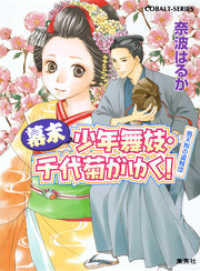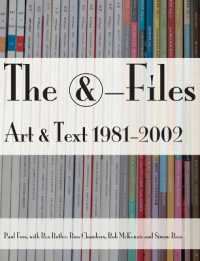- ホーム
- > 洋書
- > 英文書
- > Literary Criticism
Full Description
Shakespeare's Hamlet--written 1,000 years after the classical Greek period--follows a narrative pattern similar to that of the Greek Electra myth, and it isn't the only story to do so. We see signs of Electra's influence again in the 20th-century works of Oscar Wilde, Eugene O'Neill and T.S. Eliot, among others.
This revised and updated edition will look more closely at the influence of Electra on popular culture throughout history and the questions it poses regarding oppositions such as logic versus instinct, night versus day and repression versus freedom.
Contents
Table of Contents
Preface
Introduction
I Prehistory
Agamemnon, King of Argos
Aeschylus: The Libation Bearers (458 BCE)
Aeschylus: The Eumenides
II Sophocles: Electra (409 BCE)
III Euripides: Electra (ca. 400 BCE)
Euripides: Orestes (408 BCE)
IV Shakespeare: Hamlet (1601)
V Electra: Play of Ambivalence
Oscar Wilde: Salome (1905)
Hugo von Hofmannsthal: Electra (1903)
Richard Strauss: Elektra (1909)
Eugene O'Neill: Mourning Becomes Electra (1931)
Jean Giraudoux: Electra (1937)
Robinson Jeffers: The Tower Beyond Tragedy (1937)
VI Jean Paul Sartre: Les Mouches (1942)
Ezra Pound: Electra (1951)
Jack Richardson: The Prodigal (1960)
Adrienne Kennedy: Electra and Orestes (1980)
Heiner Muller: Hamlet-Machine (1984)
VII deleteT. S. Eliot: The Family Reunion (1939)
Sam Shepard: Curse of the Starving Class (1978)
Conclusion
Chapter Notes
Annotated Bibliography
Index








